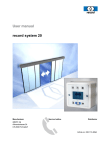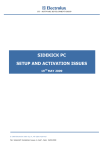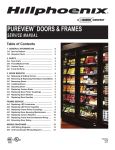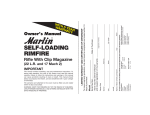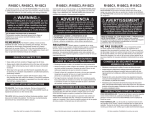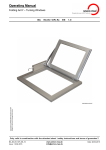Download Operating instructions
Transcript
Automatic Swing Door Operator DFA 127 IN (Inverse) Operating instructions E 1. 2. 3. 4. 5. 6. 7. 8. Page General 2 Safety instructions 3 Technical data and operating conditions 4 Construction and function 5-6 Operating instructions 7 - 11 Configurations 12 - 13 Maintenance instructions 14 Action in case of faults 15 - 20 agtatec ltd Allmendstrasse 24 CH-8320 Fehraltorf Phone +41 (0) 44 954 91 91 Fax +41 (0) 44 954 92 00 Date: 12/2006, BU article-no.: 127.109.515 A 1 General These operating instructions are intended for the record DFA 127 IN automatic swing door operator (herein after referred to as DFA 127). The operator is the person responsible for the technical maintenance of this door system. These instructions describe the use of the record DFA 127 swing door operator. They form the basis for satisfactory functioning. These operating instructions should be read by the door operator before commissioning and the safety instructions observed! It is recommended to keep these operating instructions close to the automatic sliding door. Product designation: Automatic swing door operator Product name: record DFA 127 IN Serial number: (please complete when installing) Page 2 of 20 Rev. A 12/2006 Operating instructions DFA 127 Inverse 2 Safety instructions The record DFA 127 swing door operator has been constructed in accordance with the latest state of the art and the recognised technical safety regulations, including limiting of forces and speeds. Nevertheless, danger can arise for the user if not used as intended. Installation, maintenance and repairs to the record DFA 127 must only be performed by qualified and authorized personnel (technicians). 2.1 Use as intended The DFA 127 swing door operator is constructed exclusively for normal service with swing doors in dry rooms and must be installed within or inside buildings. A different application or use extending beyond this purpose is not considered use for the intended purpose. The manufacturer declines all responsibility for resulting damage; the operator alone shall bear the associated risk. Use for the intended purpose also includes observation of the operating conditions specified by the manufacturer, including use and adjustment of the correct type of arms, in addition to regular maintenance and repair. Unauthorised modifications to the automatic door operator exclude any liability of the manufacturer for resulting damage. 2.2 General safety and accident prevention regulations In general no safety devices (sensors) may be dismantled or put out of service. During the learning cycle (which must only be performed by trained personnel) the safety devices (sensors) are switched off! It must be ensured, therefore, before initiating the learning cycle that no persons or objects are situated in the danger zone of the moving door leaves during the operation in order to avoid injury or damage! No objects must be placed in the opening zone / path of the swing door to avoid crushing and shearing points! The safeguard for crushing and shearing strains at the side edge must be provided by the manufacturer.. Operating instructions DFA 127 Inverse Rev. A 12/2006 Page 3 of 20 3 Technical Data Dimensions: Operating voltage: Power consumption: Max. torque: Opening angle: Time delay: Opening speed: Closing speed: Noise emission Operator 600 x 85 x 124 mm (w x h x d) 230V∼ Standby 13 W, rated power 67 W 50 Nm Adjustable from 70° to 115° Adjustable from 0 to 20 seconds Adjustable from 3 to 20 seconds Adjustable from 5 to 20 seconds -18 dB Environment conditions Temperature range: Humidity range: -15 to + 50°C Up to 85% relative humidity, non bedewing 3.1 Permissible door leaf weights and door widths The curves are calculated using to the following formula: J = 1/3 × m × b2 Standard arms Slide arms Page 4 of 20 : J max. 65 kgm2 : J max. 65 kgm2 Key : J = mass moment of inertia [kgm2] m = door leaf weight [kg] b = door leaf width [m] Rev. A 12/2006 Operating instructions DFA 127 Inverse 4 Construction and Function 4.1 Construction 1 2 3 4 13 12 14 5 10 11 Key to illustration: 1 Mains connection terminals 2 Fine-wire fuse 3 Power supply NET 4 Drive unit ATM 5 Control unit STG 6 Connection terminals control unit 7 Motor print MOT 8 ATE drive unit terminals 9* 10* 11 12 13* 14 15 16 6 7 9 15 8 16 Slide switch S1 (rotating direction) Multifunctional switch MF on STG Closing spring Vision panel adjust. spring tension Adjusting screw for spring tension Connectors for arms (both sides) Standard switch BDI Status signal and Reset button * Do not change any settings or adjustments! These operations are reserved exclusively for trained and authorized persons. 4.2 Components The record DFA 127 swing door operator forms part of an electromechanical swing door system and comprises the following main components: Control unit STG: Intelligent, learning, microprocessor-controlled control system. Driving unit ATE: Low maintenance DC geared motor with electronic path measurement, integral thermostatic protective switch, electro-magnetic brake and gear box with adjustable spring tension. Power supply NET: Compact 230 V power supply with integral input filter and over-voltage protection. Control unit BDE: As required with convenient, simple mechanical control unit and / or a programmable electronic BDE-D. Operating instructions DFA 127 Inverse Rev. A 12/2006 Page 5 of 20 Construction and Function Arm types: Power transmission to the door leaf by use of standard arm pushing or sliding arm pulling. Locking VRR (optional): It is possible to connect an electrical door opener (24VDC) to the operator. Sensing units: Aesthetic actuating and self-monitoring safety elements with adjustable sensitivity ensure optimum, smooth and reliable operation of the door system. 4.3 Functional description The record DFA 127 with inverse function has been designed to open without electrical power. It can be easily closed by hand and opens using the energy stored in the spring, with the motion damped by the motor acting as a generator. The door can be held closed without electrical power, for example, using the escape door opener Type 331 or 332 from eff-eff (fire door: closed without electrical power, escape and rescue route door: open without electrical power). If the door operator is connected to the mains power, the opening and closing movements will be assisted by the motor. There is thereby the possibility of fixing the door leaves in the closed and/or open position (electro-magnetic brake). In the standard "Automatic" mode of operation the door system opens by the response of an actuating device (e.g. radar unit) to persons or objects approaching. The door closes after the door hold-open time, provided no further opening pulse is received. In the "Lock" mode of operation, the door is only opened by actuation of an optional key-operated contact (SSK). The door closes after the SSK door holdopen time, provided no further opening pulse is received. An obstacle to the swing door leave during Closing leads to an immediate reopening (reverse). The obstacle position is recorded in the door operator and this position is approached slowly when next closing. An obstacle to the swing door leaf when Opening results in an immediate stop. Page 6 of 20 Rev. A 12/2006 Operating instructions DFA 127 Inverse 5 Operating instructions 5.1 Mech. control elements and indication 1 1 2 3 2 3 Mechanic BDI with 3 positions (control toggle switch) Reset button Status signal Mechanical BDI (control toggle switch) The following operational modes can be set up with the 3-position toggle switch on the side cover: Manual operation In this operating mode, the DFA can be opened and closed by hand. The door can be easily opened by hand, but must then be closed again by hand. The door is only held in position if the bolt can latch into an electrical lock. The connected actuating devices are no longer taken into account. Automatic The door opens and closes automatically through the activation of an actuating element. Continuously open The door opens and remains in the open position. If an obstacle is encountered while opening, the DFA will attempt to bring the door to the set open position for the next few seconds. If the obstacle is still present, the current position will be accepted as the continuously-open position. Operating instructions DFA 127 Inverse Rev. A 12/2006 Page 7 of 20 Operating instructions With the factory default setting, the mechanical BDI is always connected and active on a DFA 127. If an additional electronic BDE-D is connected, the operating mode will be set at the highest priority by a defined priority structure in the BDE. The priority and the code shown in the following table apply to the operating mode, whereby BDE2 (S2) and BDE1 (S1) represent the two input terminals of the control unit (Æ J7/1 + J7/2, p.c.b. BDE-M) for the mechanical BDE: (L = interruption or 0V, H = +24V) Mechanical BDI (toggle switch) BDE2 (S2) L H L BDE1 Electronic BDE-D (S1) H L L Function locked one-way continuously open manual automatic Priority (1=highest) 1 2 3 4 5 The BDE-D indicates the current operating mode. If an operating mode is set on the BDE-D, which has no current priority, the status message 62 is displayed. Reset button After pushing for approx. 5 sec. a new start of the control is performed (software reset). After the reset the LED lights up permanently. Status signal - Remains off if no fault is present. - Will blink if a fault is present (see status and fault signals / chapter 8) - Does light up permanently during a reset. Page 8 of 20 Rev. A 12/2006 Operating instructions DFA 127 Inverse Operating instructions 5.2 Auxiliary controls on the control unit STG 127 General: The STG 127 operates with an active HIGH level, i.e. a +24 V level must be applied to activate a function. Safety inputs are activated during interruptions. The signal ground (0V) is connected to the protective earth. Jumpers: J14: Master / Slave jumper at position M1 for master (factory setting) jumper at position S1 for slave J13: CAN line termination LED’s: LD1: (red) control LED for push-button operation (S1) LD2: (green) +35V Off for power failure LD3: (green) +24V Lights if +24V present. Caution: in the event of a power failure processor reset takes place 1 second after this LED extinguishes. Push button S1 This is a multifunctional switch on controller (MF). The use of this switch is reserved exclusively for trained and authorized persons. Top view of the control unit STG: Operating instructions DFA 127 Inverse Rev. A 12/2006 Page 9 of 20 Operating instructions 5.3 Functions of electronic controller BDE-D (optional) The BDE-D electronic controller is an easily operated input and output device for the control and adjustment of record door operators. Logically arranged pushbuttons allow intuitive operation and navigation through the operatorspecific menu. The LCD with backlight shows data and information about the door status with symbols and text messages. Additional information can be found in the BDE-D manual (No. 903 109 271). 5.4 Operation modes Automatic Normal function Table to signals (X marks a release reaction) CLOSED OPENING AKI x x AKA x x SSK x x x SIO SIS OPEN x x x x x CLOSING x x x x x One-way traffic In one-way traffic mode people cannot enter the room from the outside but they can leave it from the inside. Table to signals (X marks a release reaction) CLOSED OPENING OPEN CLOSING AKI x x x x AKA* x x x SSK x x x x x SIO x x SIS x x * AKA is active as safety device while closing Page 10 of 20 Rev. A 12/2006 Operating instructions DFA 127 Inverse Operating instructions Manual operation The door can be opened and be closed again by hand if it is held closed by an electrical lock. Open continuously The door is opened and stays open. Locked In the operation mode Locked the locking is activated. Table to signals (X marks a release reaction) CLOSED OPENING OPEN AKI x x AKA x x SSK x x x x SIO x SIS x Reset After pushing on the button display is: CLOSING x x x x x for approx. 5sec. this status message on the No Reset Operator? Yes Pushing again on the Operating instructions DFA 127 Inverse button resets the operator. Rev. A 12/2006 Page 11 of 20 6 Configurations 6.1 Parameter Overview Page 12 of 20 Rev. A 12/2006 Operating instructions DFA 127 Inverse Configurations Configurations of the DFA 127 can only be made with the electronic BDE-D. If a toggle switch is connected, a BDE-D must be connected briefly for the configuration. Further information for parameter changes can be taken from the user manual of the BDE-D (no. 903 109 271). Please always leave the configuration review sheet in the drive! 6.2 Parameter description Parameter DRIVING CYCLE Closing speed Opening speed TIME DELAY OPEN Time delay open Time delay SSK DRIVE Opening angle Setting range Factory default Description 0 - 40 (5 – 20 s) 0 - 40 (3 - 20 s) 18 Slider control with 40 steps 36 Slider control with 40 steps 0 - 40 (0 - 60 s) 2 0 – 40 (0 - 60 s) 4 Effective with AKA, AKI and push to actuate 0 - 20: Steps of 1 s 21 - 40: Steps of 2 s Effective with SSK 0 - 20: Steps of 1 s 21 - 40: Steps of 2 s 0 - 40 35 Operating instructions DFA 127 Inverse Rev. A 12/2006 The opening angle is estimated during the calibration run and is equivalent to the value of 40. Page 13 of 20 7 Maintenance instructions 7.1 General The record DFA 127 swing door operator is a product of the latest technology. It has been carefully made and only leaves the factory following thorough testing. Automatic swing doors should be operated and maintained to ensure safety at all times. 7.2 Care The entire swing door system can be cleaned with a damp cloth and commercially available cleaning agents. The cleaning agent must be harmonised to the surface which has to be cleaned. It is recommended to select the "Continuously open" or "Locked" mode of operation for this purpose, so that the door does not continually open and close unnecessarily. 7.3 Maintenance, periodic inspection It is recommended to have a technical safety test with servicing performed by a specialist before first commissioning and as required, but at least twice a year. Regular testing and servicing by our fully trained personnel therefore offers the best guarantee for a long service life and satisfactory operation. We therefore recommend the signing of a maintenance agreement. Our service department will be pleased to submit a proposal. If nevertheless a fault should occur, which you cannot eliminate (see section 8) our service organisation or the maintenance personnel of our agents are available. 7.4 Service centres In Switzerland: Phone +41 (0) 44 954 92 92 / Fax +41 (0) 44 954 92 00 Alternative service centre: _____________________________________________ Page 14 of 20 Rev. A 12/2006 Operating instructions DFA 127 Inverse 8 Action in case of faults 8.1 Fault indication Various indications are given for an irregularity or fault depending on the control unit connected BDE-E or BDE-M. When using a mechanical BDE (control toggle switch) With the mechanical control unit it is not possible to display a detailed status signal. If a fault occurs (will be shown by the status signal on the side cover), please proceed according to section 8.2. When using an electronic BDE-D General Any current operational faults in the drive system will be displayed in the Standard screen. If several faults are active, they will be numbered: e.g. Fault 1/2 In case of an irregularity the display changes automatically from mode of operation level to error display. Every 2 seconds the backlight changes between normal /invers. Several errors can be displayed (e.g. 1/2 means: error no. 1 of total 2 errors). After 10 seconds the telephone number of the responsible service centre is indicated alternating to the fault indication. The failure indication and the phone number change every 5 seconds, while the inverse flashing is remaining. The described sequence applies to all failures. However, previously the phone number must have been given by an authorised specialised person. Information about the drive system, such as the software version, can be read out by pressing the key. After pressing this key once again, the phone number of the responsible service centre and the last appeared fault indication is displayed in the screen. If the fault message consists of several lines the first line will be displayed only. Status signals with a "W" are warnings. For these the fault relay contact output is not connected. Elimination of the irregularity leading to the status signal is performed according to section 8.2 A status can usually be deleted by pressing the key for 5 s (= Reset). This produces a new start in the control unit. If, however, the cause of the fault has not been eliminated, the status message will appear again if the fault occurs again. Operating instructions DFA 127 Inverse Rev. A 12/2006 Page 15 of 20 Action in case of faults 8.2 Error elimination The majority of faults can be eliminated by consulting the following table. If the fault cannot be eliminated even after working through the table, please contact the service centre. Please also contact the service centre directly when no recommended action is specified in the table. Status Symptom, fault, door behaviour 03 Door remains open 05 Door remains open 06 Door does not unlock Cause Action (consult service if no recommend-action) Actuating device inside active longer than 60 s Actuating device outside active longer than 60 s Unlocking fault 23 Control unit SLAVE defective Reset by service fitter 25 MASTER / SLAVE connection interrupted Reset by service fitter Release EMERGENCY STOP button 31 Door stops EMERGENCY STOP button operated 37 Door stops Faulty motor current 38 Door changes to manual Excess temperature motor control Peripheral devices take Overload on +24 V supply too much power Wait until motor has cooled 41 Door stops Motor 1 thermal sensor defective Reset by service fitter 43 Door stops Incremental transmitter defective 45 Minimum hold-open time Motor current time product too large increased to 20 secs. 46 Door stops 39 47 50 Reset by service fitter Reset by service fitter Wait until motor has cooled Control unit defective Reset by service fitter Door remains closed SIO sensor longer activ than 60 sec. Remove obstacle from surveillance range of sensor Door stops Control unit defective Reset by service fitter No valid drive parameter Initiate calibration run 52 53 Door stops Interruption motor Reset by service fitter 54 W Door jolts possibly while opening Calibration run Initiate 1 opening cycle Door stops SIS sensor longer activ than 60 sec. Remove obstacle from surveillance range of sensor 60 Door stops Parameter memory defective Reset by service fitter 61 Door remains open Key operated contact active longer than 60 s Release key contact 62 W Higher-order mode of operation present Control unit BDE has no priority Cancel higher-order mode of operation 59 Page 16 of 20 Rev. A 12/2006 Operating instructions DFA 127 Inverse Status and fault signals 8.3 Detail description of status indications General A status can usually be deleted by pressing the key for 5 s (= Reset). This produces a new start in the control unit. If, however, the cause of the fault has not been eliminated, the status message will appear again if the fault occurs again. The following list contains the causes of faults in decreasing possibility. The fault at the bottom of the list has the smallest probability to occur in the control unit STG. Status 3: AKI sensor active longer than 60 s Automatically reset if everything is in order, or by service fitter Status 5: AKA sensor active longer than 60 s Automatically reset if everything is in order, or by service fitter Status 6: Unlocking error Bolt possibly jammed Reset by service fitter Status 9: “Opening” unsuccessful (after 4 collisions) Check the interlock / remove obstacle Reset through service fitter Status 11: Faulty motor current Possibly faulty wiring in prefabricated cables Replacement by service fitter Status 23: Slave control unit defective Replacement by service fitter Status 25: Slave connection (CAN) to Master interrupted Clear by service fitter Status 31: EMERGENCY STOP operated. Motor relay de-energises Reset by resetting the EMERGENCY STOP button Status 37: Motor current STG or ATE defective Reset by service fitter Status 38: Overheat motor Manual control effective Door leaves possibly too heavy, or too much friction Reset by motor cooling down or by service fitter Operating instructions DFA 127 Inverse Rev. A 12/2006 Page 17 of 20 Status and fault signals Status 39: Overload on + 24 V supply Too many external units possibly connected Reset by service fitter Status 41: Motor – temperature sensor defective Motor possibly not connected Sensor in motor possibly defective or cable break in sensor lead Reset by service fitter Status 43: Incremental encoder fault Input cable possibly not connected or cable break in the lead Motor possibly blocked Reset by service fitter Status 45: Motor current – time product to high Motor relay de-energises Manual control effective Automatic reset by motor cooling or by service fitter Status 46: Control unit STG defective Includes the following individual faults: EPROM, RAM, Watchdog, Imax, ImaxT, difference on SHE-EXT Reset by service fitter Status 47: SIO sensor active longer than 60 s Automatically reset if in order, or by service fitter Status 50: CPU2 is defective Reset by service fitter Status 51: Software version Software version of Master and Slave do not correspond to each other. Software update by service fitter Status 52: No running parameter Start calibration run Status 53: Interruption motor Possibly no connection to motor Reset by service fitter Status 54: Calibration run Reset automatically Status 59: SIS sensor active longer than 60 s Automatically reset if in order, or by service fitter Page 18 of 20 Rev. A 12/2006 Operating instructions DFA 127 Inverse Status and fault signals Status 60: Parameter memory (EEPROM) defective Change control unit Reset by service fitter Status 61: SSK active longer than 60 s Automatically reset if in order, or by service fitter Status 62: BDE has no priority Because a higher-level signal is present Automatically reset on release of BDE-button Status 72: Slave connection Master has no connection to Slave operator Reset by service fitter Status 88: Difference parameter The common parameters of M/S operators do not correspond to each other. Reset by service fitter Status 89: Master connection Slave has no connection to master operator Reset by service fitter Status 90: Railbeam active > 60 sec. Automatically reset if everything is in order, or by service fitter Status 91: Bodyguard active > 60 sec. Automatically reset if everything is in order, or by service fitter Status 92: STG relay defective Replacement by service fitter Status 93: Overvoltage 24 V (from 27V) Status 94: Spring calibration Automatic reset Status 95: Error in sense of rotation Status 96: EEPROM void Status 99: Operator rotates The grease in the gear will be dispersed. Automatic reset Status 105: Test brake Automatic reset Operating instructions DFA 127 Inverse Rev. A 12/2006 Page 19 of 20 Status and fault signals Status 106: Brake defective Reset or reset by service fitter Status 107: SIS defective A safety sensor (with test input) in closing direction is defective. Reset by service fitter Status 108: SIO defective A safety sensor (with test input) in opening direction is defective. Reset by service fitter Status 109: Factory settings Status 110: No motor No motor detection during initialisation (motor temperature sensor). Check motor temperature sensor. Reset or reset by service fitter A status number with a "W" is a warning !! Page 20 of 20 Rev. A 12/2006 Operating instructions DFA 127 Inverse





















